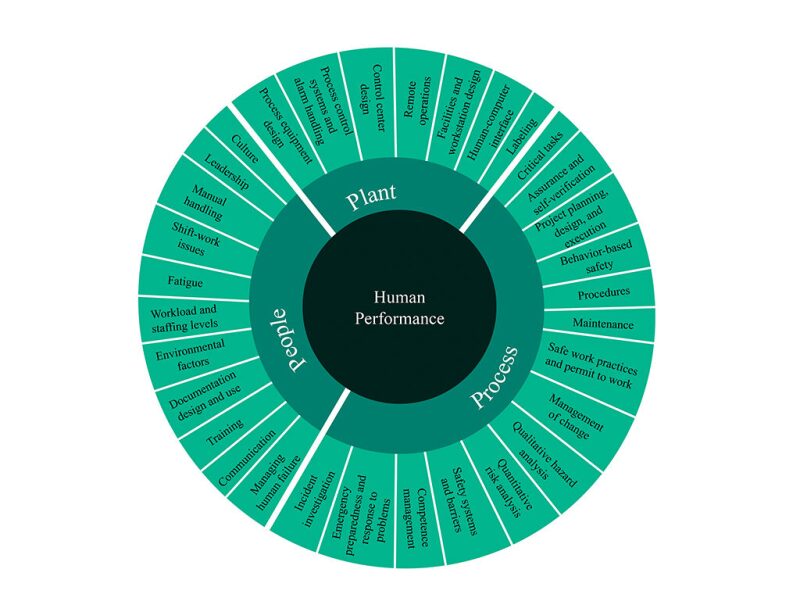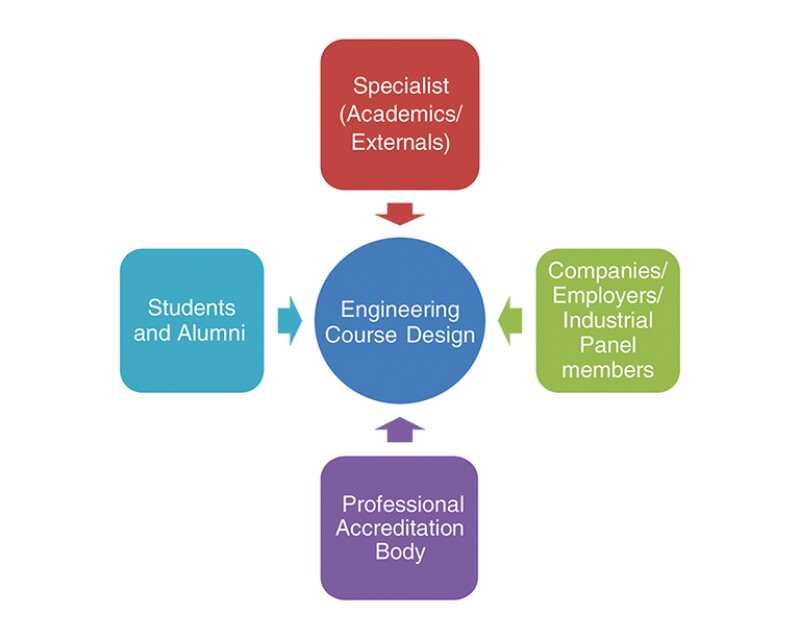One of the biggest challenges related to the practical implementation of human performance (HP)/human factors (HF) is the lack of awareness among very large and diverse groups of people. These individuals include leaders at all levels of the hierarchy; engineers; health, safety, and environment (HSE) professionals; and front-line employees. Further, most of them may have an engineering or related technical background as discussed in Closing the Gap in Human Factors: Everybody Has a Role To Play.
The oil and gas industry requires a continual supply of new engineers. Globally, thousands of graduates are joining the industry every year, and it is important to explore if they are getting a strong foundation in HP/HF.
Perspectives on Engineering Education
In this section, four experts in HP/HF share their perspectives on engineering education. Based on the insights they provide, I conclude with a call for action for various stakeholders to advance the integration of HP/HF with engineering education.
Human Performance will play a significant role in taking our safety performance to the next level.
Fawaz Bitar, Senior Vice President of HSE and Carbon, BP
Traditional ways of managing safety only get you so far. Having a better understanding of human behavior and the interaction among people, equipment, and processes will provide a more holistic approach to managing safety.
I believe that human performance will play a significant role in taking our safety performance to the next level, including the use of digital and technology to reduce the likelihood of human error.
However, several barriers are slowing down our progress.
First, the linkage could be stronger between the HP experts (i.e., those with the detailed knowledge) and those who execute the work. To advance HP, we need to raise the awareness of HP at every level, including supervisors and senior managers. This could be done through training programs with content tailored to the audience to demonstrate the practical value of HP. We also need to integrate it into how we lead and operate.
Second, we need to increase the uptake of digital and technology to improve safety by moving up the hierarchy of controls and removing the need for human intervention. This could include several things: new technologies to get risk information where it’s needed (i.e., from the boardroom to the control room); remote observation tools and robotics to reduce risk; and advanced data analytics to identify trends and help us course-correct faster.
Third, there is lack of standardization across the industry related to HP. We could benefit by having a common set of concepts, principles, and language. I am aware that the HPOG (Human Performance Oil and Gas) is making good progress on developing an HP recommended practice that should help unify practices, standards, and tools.
Finally, there perhaps is an inconsistent approach to teaching HP at universities, for example as part of an engineering degree curriculum.
By knowing how people work and respond, engineers are able to come up with much better solutions. Teaching HP as a foundational part of engineering degrees would allow students to join companies well equipped to deal with the challenges ahead of them.
I am privileged to lecture on HP and risk management at several universities and internally at BP. A collaboration between academia and industry can be very powerful, bringing together the best of each community. If we can bring real-life experiences, underpinned with academic theory, we will have a winning formula.
There are indications that some engineering programs offer HF; however, there is more work to be done.
Maria Astrid Centeno, Course Director, MS petroleum engineering, London South Bank University
Internationally, the content of engineering degree programs is based on educational frameworks set by the international engineering alliances such as the Washington Accord, the Sydney Accord, and the Dublin Accord.
In the UK, the Quality Assurance Agency for higher education (QAA) provides the framework for all UK higher education programs across all subjects. Moreover, the QAA supports the Engineering Council and professional engineering institutions to provide support to engineering courses offered by higher education providers across UK universities. As the Engineering Council is a full member of the Sydney and Washington Accords, UK engineering programs are designed following international standards.
According to those standards, engineering programs in higher education must provide students with six aspects, even though the syllabus for each engineering program may vary among providers:
- The learning and application of the adequate level of mathematics and science
- The skills and experience to apply engineering analysis to solve relevant real cases
- The knowledge and understanding of the engineering principles and procedures associated with the design
- The application of innovation processes to solve real engineering problems
- The learning and application of the evaluation of essential needs, including economic and environmental impact, legal obligations, and health and safety, so that graduates are able to propose solutions and develop process guidance to broadly define problems
- Transferable skills such as communication, reporting, working with relevant engineering software, problem solving, leading and managing
While HF is not mentioned as a separate area, some relevant HF topics are embedded in many syllabi already. For example, per the Engineering Council specification, students should be able to “design solutions for complex problems that meet a combination of societal, user, business, and customer needs as appropriate. This will involve consideration of applicable health and safety, diversity, inclusion, cultural, societal, environmental, and commercial matters, codes of practice, and industry standards.”
Some programs include the use of a well-control simulator, which supports the development of HF related to individual behavior and decision making.
By comparing the learning outcomes provided by engineering programs with the list of HF topics (Fig. 1), it can be noticed that there are some knowledge gaps, mainly associated with people’s behaviors at work and their behaviors related to the process and available technology.

There are indications that some engineering programs offered by some members of the international Washington Accord include the learning and application of human factors that are associated with process management and process design. Still, engineering students may not be getting enough experience in other relevant aspects of HF, such as understanding why front-line operators do not follow the rules, preventing and managing fatigue, workload and staffing levels, managing human failure, or shift-work issues.
In practice, the learning outcomes provided by accreditors of academic programs are not strictly prescriptive in terms of the way students will be learning and assessed on each outcome. Each program provider has the responsibility to design his/her own descriptors based on engineering learning outcomes and with specifications related to the engineering specialty per the professional accreditation body.
The process of reviewing and updating engineering courses includes feedback from different stakeholders such as academic specialists, employers, accreditation bodies, and students/alumni (Fig. 2).

There is growing feedback from oil and gas companies on the need to equip engineering graduates with more knowledge, awareness, and practical experience in HF. University programs could contribute by either incorporating relevant practices of HF as embedded in existing descriptors or providing students with training or practical workshops on HFs related to the professional practice. Those special workshops could be also led by accreditors to support universities and students’ employability. For example,
Different types of engineering programs likely need to learn different levels or types of information about HF.
S. Camille Peres, Associate Professor, Environmental and Occupational Health, Texas A&M University; Assistant Director, Human Systems Engineering Research, Mary Kay O’Connor Process Safety Center
Although all engineers should have some background in HF, some need to have a deep understanding of HF (e.g., industrial engineers), while others may need to know the general principles and how to integrate the skills and knowledge of an HF professional into their work (e.g., electrical engineers). This suggests that standardization of the appropriate HF content for all engineering programs may need to be adjusted to the type of course. However, it is reasonable to assume that all engineering graduates should have a baseline of understanding regarding HF principles, methods, applications, and the risks associated with not considering HF when designing systems and interfaces.
In principle, it would seem that requiring an introductory-level course in HF would suffice for this. However, a challenge—at least in the US—is that most engineering degree programs have limited room for another course. Indeed, at Texas A&M University, the chemical engineering degree has only one elective (and it is a science elective) and the petroleum engineering degree has none.
Most engineering and technology degrees programs in the US are accredited by the Accreditation Board for Engineering and Technology (ABET). To maintain accreditation, degree programs must adhere to the curriculum requirements set by this organization as well as those set by other organizations (e.g., in Texas there is a common core curriculum requirement). For there to become room available in the engineering curriculum (in the US at least), ABET would need to adjust some of its requirements. This would require clear and consistent pressure from industry and regulators regarding the need for the changes to improve the safety and functioning of the systems the engineers are designing.
HF learning can be done across departments.
Promise Ahante, Graduate Petroleum Engineer, Imperial College London; Past President, SPE Student Chapter
My exposure to the topic of HF as part of engineering education was fairly limited. During my undergraduate study in petroleum engineering, I heard that about 60–80% of accidents are due to human error, with no detail about its contributing factors.
During my master’s degree, I did learn more about how weak safety cultures represent a major factor responsible for human error, which may lead to accidents. However, the two modules that mentioned the importance of safety culture (drilling and well-testing) were taught by industry professionals who had decades of experience as drilling managers.
I’ve mostly been exposed to various elements that may contribute to human error such as fatigue from working extended shifts, personal issues, and not having prerequisite training during my internship in an oil and gas processing facility. However, I’m not sure I fully understood these distinctions among psychological, organizational, and other HF components in a way that made me realize their significance.
While I believe that engineering students should learn solid foundations of HF in their education, I’m not convinced the industry incentivizes this. For example, I have never seen my colleagues indicate HF knowledge on their CVs [curricula vitae], nor heard employers expressing interest in graduates having HF knowledge as a job prerequisite. Investing effort into developing HF knowledge does not seem to make a difference when searching for a job after graduation.
There also may be an absence of guidance on what should be taught and how to teach it and an absence of HF specialist knowledge at universities.
To address these, HF awareness must be acknowledged by engineering universities or departments as significant beyond just a mention. It should be incorporated through immersive/practical or scenario-based learning. While some engineering departments may not have HF specialists, HF learning can be done across departments, through integration and shared learning between engineering and core HF disciplines.
Marcin Nazaruk, Chair of the SPE Human Factors Technical Section; Human Performance Leader, Baker Hughes
A Call for Action
Having read these reflections on the importance of HP/HF and the growing interest of the industry, it is clear that more work is needed to specify how exactly to close the gap between what the industry needs and what universities can provide.
There is a broad range of institutional stakeholders involved in setting the curricula. Some possibilities for this are outlined in Table 1.
Through this article, I intended to promote debate on integrating HF into engineering education and to propose some next steps. If the stakeholders listed below did take action and initiate dialogue, we may be able to accelerate efforts to make our industry safer.
Proposed Actions for Stakeholders To Increase Engineers’ Knowledge of HF in the Petroleum Industry
| WHO | PROPOSED ACTION |
| All readers |
|
| Leaders of the international engineering alliances: the Washington Accord, the Sydney Accord, the Dublin Accord |
|
| Executive leaders of oil and gas companies |
|
| HR leaders responsible for graduate recruitment |
|
| Leaders of the professional accreditation bodies (e.g., IChemE, ABET) |
|
| Engineering degree course directors |
|
Leaders of the international industry organizations and associations (e.g., IOGP, SPE, IADC, EI) |
|
Leaders of the HP/HF professional societies such as the International Ergonomics Association, UK CIEHF, US Human Factors and Ergonomics Society, and their equivalents in other countries. |
|
| Students |
|


